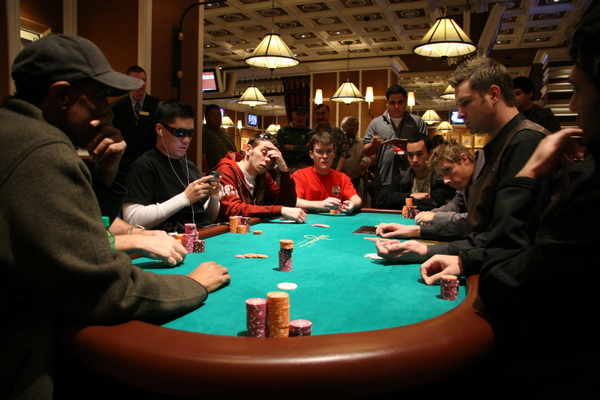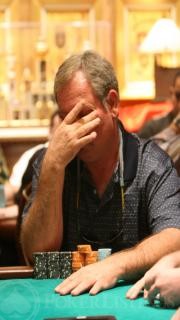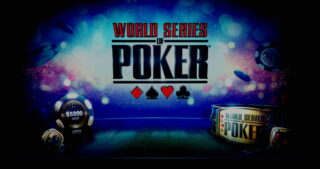This is a very simple poker lesson:
- When you flop a big hand in poker, you want to create a big pot
- If you have a weak hand, you want a small pot
Simple, yeah? A lot of beginner poker players make the mistake of building large pots with one-pair hands only to eventually fold when the pot gets big.
Here's how you can keep pots small when you have a weak-ish hand and build big pots with your big hands.
Why Pot Control is Critical in Poker
The game is $1/$2 No-Limit Hold'em and effective stacks are $200. You're dealt A♠ K♦ on the button.
The two players in the blinds are solid TAGs. It's folded to you and you raise to $8. Small blind calls, big blind folds.
The flop comes down K♥ 3♠ 5♣. Your opponent checks and you bet $15; your opponent calls.
The turn comes 6♦. Your opponent checks and you bet $35. Your opponent calls.
The river comes 6♠. Your opponent bets $100 into you.
This hand is ugly. You have a strong hand and your opponent is showing massive strength on the river. Both folding and calling are bad here.
This is a tough spot because the pot is now very large and your hand, while strong, is not the kind of monster that would make you confident about getting all-in here.
If you had practiced pot control, your river decision would have been much easier.
Have a Big Hand, Build a Big Pot
When you flop a big hand, you want to win your opponent's stack.
"Big hand," however, isn't easily defined. It could be a set or a straight or two pair or even top pair. I define a big hand as:
- A hand that you're willing to play for stacks against a certain opponent
This is a sliding scale. Against one loose player it may be correct to play a big pot with one pair. Against another, tighter opponent it may be a huge mistake.
The only way to tell is to observe the table rigorously and know your opponents. Your stack is a tool. You use it to win the other person's chips. You cannot win their stack without putting yours on the line.
You can, however, decide when you put your stack on the line.
Related Reading:
Practice Pot Control in Free Poker Games on PokerStars
Only Risk Your Stack with a Big Hand!
You should only risk your whole chip stack if you have a big hand. And you should seldom find yourself in a big pot having to fold.
To do that you have to maintain control of the pot size - meaning if that pot is big it's your fault and you'd better have a big hand.
Otherwise you need to look back and see how this big pot was created. Did you initially have a big hand and the situation has changed? Or had you been slowly building a big pot all along with a hand you weren't committed to?
Rather than building pots with all sorts of hands and then folding when the action gets too big, plan your hands. Know from the beginning how much action you can take with your hand and, if it's not a big-pot hand, then take a different line.
Related Reading:
Have a Small Hand, Play a Small Pot
Now that we've defined a big hand, pinpointing a small hand is easy:
- A small hand is a hand you don't want to play a big pot with
As a general rule you should avoid playing for stacks with one-pair type hands.
If you are called you're normally behind. So when you have a hand like top pair you should exercise pot control.
Remember you are in charge of the hands you play! You build big pots when you have big hands and when you have smaller hands you actively control the size of the pot so you're not put to a tough decision.
If you're always in control of the pots you're in it makes it extremely difficult for your opponent to win your stack. This is why many players can employ a loose-aggressive strategy successfully.
They may appear to be playing crazy but that's only when the pots are small. If they play a big pot, you can rest assured they have a big hand.
Use Pot Control on the Turn!
Pot control can and should be used when you have a hand that isn't good enough to play for stacks. This hand could be second pair, it could be top pair; it could even be an overpair. It all depends on who you're playing against.
Let's look at an example of keeping the pot small by checking the turn:
Game is $1/$2 No-Limit; effective stacks are $200. The players in the blinds are both solid TAGs. It's folded to you on the button with K♣ Q♦. You raise to $6; the SB folds, the BB calls.
The board comes Q♥ 3♦ 7♣. Your opponent checks and you bet $9; he calls. The turn is the 3♠. Your opponent checks and you check behind.
Related Reading:
A Win-Win Situation
This is a very good use of pot control. Your hand - top pair, good kicker - is strong.
Nonetheless, it's not a big hand, meaning you wouldn't be willing to play for stacks against your TAG opponent. You know this player is not going to call down three streets with a hand you beat.
Let's say for example he did flop a set here. If he check-raises the turn you may have to lay down the best hand or fold with money invested.
So you can check behind now on the turn to keep the pot small in case you are behind.
If he now decides to bet the river, the pot will be small enough you can justify a call. You'll be able to see a showdown for what it would have cost you to bet the turn!
Checking the turn may also cause him to bet or call with a worse hand on the river, so it's a win-win situation.
When Shouldn't You Use Pot Control?
Pot control should only be used when the board is dry. It's never advisable to not protect your hand. So if your hand is vulnerable to draws, you must continue your aggression. You do not want to allow draws to get in cheap!
An example that shows why it's crucial to be know when your hand is vulnerable to draws:
Game is $1/$2 No-Limit; effective stacks are $200. You raise to $6 from middle position with A♦ K♦. Everyone folds to the big blind, who comes along for the ride. The flop comes K♠ 6♠ 7♣.
Your opponent checks and you bet $10. Your opponent calls. The turn is the 2♦ and your opponent checks again. This time you bet $25.
Bet Now to Protect Your Hand
This board is far too wet to allow a free card here. There are quite a few draws in his range and the river could bring a number of less-than-stellar cards.
So bet now to protect your hand. It's rarely advisable to give free cards when your hand is vulnerable.
Pot control, like most poker tactics, is not a gambit you can use all the time. It is situation-dependent.
If you know your opponent is going to call three streets with hands you beat, then by all means value bet relentlessly.
By now it should be evident that pot control should be used when your hand isn't strong enough against a given opponent to play for a big pot. You are control of the pots you play.
So save your big pots for big hands and when your hand isn't big, play to protect your chips.
But ....
Now: How many times have you heard someone say "With pocket aces, you either win a small pot or lose a big one"?
If you've never heard it before, just wait. I promise you this will not be the only time you'll hear such a claim.
At the same time, you'll have the same players who espouse this maxim playing random any-two low cards into multi-way raised pots under the theory:
"Players only raise, and call raises, with big cards, so there's a better chance these small ones will hit the flop and crush the big-card hands.
"There are elements of truth to both of these statements. In fact, both statements have enough truth that I feel it's incorrect to pronounce them "incorrect."
However, it's my goal in this article to try and point out the holes in this logic and how they came to be.
A Hypothetical Big Hand, Big Pot Situation
Here's a hypothetical situation: We're in a cash game with 10 players. The Hero is a TAG (tight-aggressive) player and has a table image to match.
The other players are all solid with no gamblers or hyper-aggressive personalities among them. Everyone has a healthy medium-to-deep stack.
We're going to classify a big hand as being only the top four hands for this discussion: AA, KK, QQ and JJ. A small hand is in the realm of low connectors and suited one-gappers.
Big Hand, Small Pot
The odds of getting dealt pocket aces are one in 221. Include the other three high pairs into this and you lower that to one in just over 55.
The odds of you getting one of these hands at the same time as another player become increasingly sparse (if anyone wants to do the math for me, throw it in a comment at the bottom of the page).
The vast majority of the times you're dealt one of these hands, none of your opponents will have a hand that makes it worthwhile putting any serious money in the pot.
When players have a hand worth seeing a flop with, such as a low pocket pair, they're going to miss hitting a set on the flop close to 87% of the time, making for a fold on the flop.
So for the vast majority of the times we are dealt a big hand, we'll win very small pots. The remainder of the time, your opponent will have a hand worth putting money into.
In these scenarios the pots are going to be rather large.
It's impossible to generate numbers for how often you will win the pot here, because there are far too many factors in this scenario. One of these factors is a major contributor to the perpetuation of this theory.
Related Reading:
Till Death Do Us Part
Beginners have a tendency to get married to these hands. In situations where an opponent has the best hand, pre- or post-flop, the amateur in question is unable to fold.
They'll put all their money in to lose very large pots with these big hands.
In cases where the hand does hold up, the best-case scenario is you're up against an opponent like this who's married to their hand. On other occasions you will be up against a stronger player who is able to fold.
If every time you lose, you lose a stack, and you only win a stack half the time you win, you're going to feel, rightfully, that you're losing more than you're making.
The final factor is best summed up in a line straight out of Rounders:
"In Confessions of a Winning Poker Player," Jack King says, "few players recall big pots they have won, strange as it seems, but every player can remember with remarkable accuracy the outstanding tough beats of his career."
The players who believe in this theory are the same players who forget the majority of the times they did win a big pot with the big hand and remember all the losses.
Put these two factors together and you have a theory that seems irrefutable. You should be playing for stacks with big hands, yes. This advice is dead-on accurate. But it's only applicable to stronger players.
If you're not good enough to fold pocket aces when they're beat you must truly adjust your game to losing less versus winning more.
Small Hand, Big Pot
An amateur player prone to getting married to their hand will rarely get married to anything less than top pair.
By playing hands such as 7-9 off-suit you're putting yourself at minimal risk of flopping anything worth getting wrongfully married to.
At the same time, when you hit the miracle flop 6-8-5, you look like a hero against AA to win a huge pot. You win big pots when you hit, and you don't get married into losing big pots when you miss.
I'm going to be honest: there is nothing wrong with this philosophy. In fact, I'll endorse it.
Although you will never have the equity with hands like this to have pot odds, you will have implied odds. In cash games, played correctly, these can be big money-making hands.
If we change our criteria for a small hand to higher marginal hands such as J-Q, K-Q, K-J and so forth, our perfectly robust theory goes out the window.
These hands are easily dominated by any and all of the premium hands. Anyone willing to put large money into the pot against you when you flop top pair with K-J probably has you beat.
The theory of small hand, big pot only applies to sub-marginal hands.
Never Bet the Middle Hand!
Big hands - Make good money.
Marginal hands - Make small money, or break even.
Small Hands - Make good money.
This coincides with the accepted theory that you should never bet the middle hand.
Imagine a card game with two players. The game only contains three cards: One ace, one king and one queen.
Both players are dealt one card before a betting round. When the betting round ends the cards are turned over with the winner winning the pot.
In this scenario you would always bet with the ace (big hand). Having the nuts you'll never lose and you can get a call from a king, hoping you have a queen and are bluffing. If you have the queen (small hand) it makes sense to bet, hoping to make a king lay-down thinking you have an ace.
If you have the king (marginal hand), it never makes sense to bet. A queen will never call and the ace will never fold. You have the possibility to make money betting the small and the big hand but never with the middle hand.
There is No One Correct Way to Play Poker
How-to-play edicts that center on pot size versus hand size, like the majority of poker strategy, are context-dependent. There is no one correct style to play in poker!
Every situation is open to interpretation and debate. So it's no surprise that both Big Hand, Big Pot and Big Hand, Small Pot can be correct while seeming contradictory.
With big hands you should always be playing for stacks or big pots, even though it will seem as if you'll be winning mostly small ones. With the marginal hands you should be playing for small pots.
With small hands you can win very large pots without risking large losses yourself. This is one of the reasons you will see hands such as this being played into raises by the professionals at high-stakes poker.
The middle hand example is designed to make you aware of poorly placed bets and dark tunnel bluffs. These are the types of concepts that allow you to be a strong, consistent player while playing in an aggressive style.
Every action you make in poker needs to be done for a reason. You bet to accomplish a goal, not just for the sake of betting!














The A k Q example is the best thing i ever heard for poker…